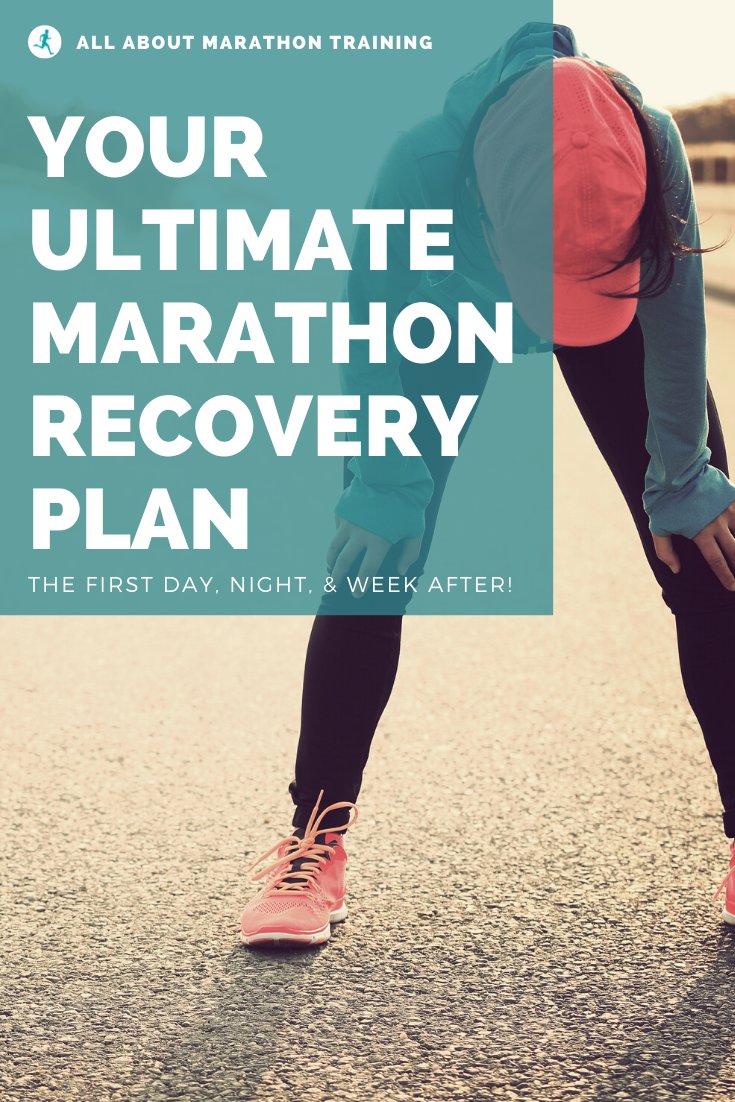How long does it take to recover from a marathon
+ How to start up again
Completing the marathon distance requires months of commitment and dedicated training.
Because of the immense physical and mental strain during this interval, careful consideration of the post-race recovery period is also required.
I get it.
The days post-marathon can be challenging for marathon runners who are so elated with the monumental achievement of finishing on race day that they want to continue preparing for the next race.
-Or challenging for the dedicated runner who fears fitness decline is in the makings while taking it easy.
These concerns probably have you pondering how long you need to commit to recovery.
Followed by: “How do you ease back into training after all that time off to start preparing for the next big race?”
Both are great questions and both are answered below.
But first, relax!
The days post-race make up a crucial period that will actually help you get back on the road ready for those next running goals.
That well-known quote from Benjamin Franklin expresses this best: An ounce of prevention is worth a pound of cure.
First things first: The Recovery Period
After many weeks of acute training and the marathon itself, your stressed body now needs a break.
Without a proper period of recovery you will negatively impact your fitness making you at greater risk for injuries.
By properly recovering, you will repair and rebuild the tendons, ligaments, muscles, cells, your immune system, inflammation and any other suffering body component.
To give you an idea of how long you should recover, a general recommendation is to allow 1 day of rest for every mile that you run.
So yep, for the marathon distance, that’s 26 days before resuming your next running program. (13 Days for a half marathon - check out this page for tips on how to recover from a half marathon).
Now, of course, by week 4 you will be doing more activities than week 1 - but you still shouldn’t be too intense about training.
Keep in mind, you want to maximize the recovery period to be prepared for future running.
Of course, this length of time varies from person to person.
The intensity of the training period, your fitness level, your age, the physical results from your marathon, your health, your current nutrition status, your mental state can all contribute to varying recovery lengths.
The good news is how you implement recovery will be a strong contributing factor to how long it takes. Good because this is something that really isn’t that hard to control.
Read on for a general overview of each week of the recovery process.
For in depth specifics regarding this phase, this very comprehensive recovery guide is a must! It covers everything!
The First Week Post Marathon
It is necessary to emphasize that active recovery starts the minute you cross the finish line.
Studies consistently show that the best way to set your recovery up for success is to apply tactics as soon as you finish your race.
In a nutshell, right away you’ll want to rehydrate with water and sports drinks followed by gradually cooling down while incorporating some gentle stretching.
Then, within 15 to 30 minutes, it’s important to consume more complex carbohydrates as well as some high protein foods.

(Do view that comprehensive recovery guide I mentioned above as you’ll get more details and know exactly what to do to expedite recovery.)
Once you get through the first several hours, you will spend the next day and actually the first full week mainly focusing on:
- rest,
- addressing any inflammation and aches and pains, and
- incorporating some very light activities (easy walks) and low-impact exercises (mostly stretching).
Expect delayed onset muscle soreness (DOMS) to set in and peak around day 2 or 3. Stretching and the light exercise will help combat this as will water immersion therapy.
All the while continue your good nutrition habits to help repair muscle damage and replenish glycogen stores. -And of course, remain well hydrated to provide the fluids necessary for overall well-being.
The Second Week Post Marathon
The second week can include more of the first week with a light jog and some low-impact cross training thrown in.
Think recovery runs (relaxed, slow paced runs), recreational swimming and recreational biking.
Now this doesn’t mean you should be moving every day. In fact, limiting these activities will be better than overdoing it so err on the side of caution.
Keep in mind that although you’ll be feeling better during this second week and may be tempted to jump back into full training, refrain. The healing process is still going on behind the scenes so don’t cut it short.
Of course, if you have experienced any sort of injury, omitting activities might be necessary.

Weeks Three and Four Post Marathon
As previously stated, much of the recovery is internal in these later weeks.
I know, I know - when you’re feeling pretty good, it makes it difficult to continue the recovery process. Out of sight, out of mind, you know? But still, skipping over this crucial period has the potential to set you back later on. This is still not the time for strenuous exercise.
Some of you may be ready after week three to resume training.

How to know?
If you can say “yes” to any of the following, hang on - you would do best by resting the full 26 days.
- Is this your first marathon (or half marathon)?
- Is abnormal fatigue still present?
- Do you still have lingering soreness?
- Was your training intense?
- Did you sustain any injuries during training or during the marathon itself?
- Were you aiming for a personal record?
For those of you who need more time off, no shame in that.
Depending on your situation, you can add in a few slow easy runs and continue with the low-impact cross-training during this third and fourth week.
Just pay attention to your body and go gradually.
Resuming Training - Reverse Tapering
Finally! It’s time to get back out there where you belong!
It’s now okay to include some structure by creating and following a training program.
Gradually starting back into your running program requires mindfulness.
It's not a good idea to resume your training where you left off. By increasing your exertion in a balanced manner you will avoid a setback.
Employing moderation (which is what a reverse taper does) is a great way to safely increase conditioning to get you back to your previous base level without injury.
And, in fact, if you’ve already implemented some slow easy runs and low-impact cross-training, you’ve already started the reverse taper process.
Let’s see how this works!
Week Four or Five - Starting Up Again
The progression, duration and intensity of this reverse tapering phase will really depend on you.
Be very in tune with how your body is responding as you gradually increase your training. Do not hesitate to cut back or even lay off if needed.
By moving forward slowly, you will reduce risk of injury and the stress placed on the body.
You don't need to start over with square one of a training plan but you do want to start off at a place you were comfortable at whether that be 4, 6, 10 or maybe even 12 miles.
Here are some tips to get you off to a good start.
1. Create New Goals
Having a clear purpose, whether it’s to run your next long race in a certain time or to achieve personal milestones, will keep you focused and motivated.
Just make sure your goals are realistic and align with your capabilities.

2. Implement Short Easy Runs
Easy runs are low-intensity runs at an easy pace. Be mindful of how your body is responding. If all is good, gradually increase your time and intensity.
You could also try the run-walk method. This method was taught by James Galloway and is sometimes referred to as “The Galloway Method”.
The method is just like the name sounds - you alternate back and forth between running and walking. The impact placed on joints and muscles is alleviated by the less intensity of this approach. Additionally, your cardiovascular system adapts to running again in a very gradual manner.
Read more about the run-walk method in this Run Walking: Your Ultimate Guide post.

3. Continue Stretching
Flexibility will be enhanced and muscle tightness prevented with planned stretching.
4. Gradually Incorporate More Cross-Training
Cycling, swimming and/or light strength training will help maintain fitness while preventing overuse injuries.

5. Be Attentive to Body Signals
Again, modification of your training program might be necessary if you experience any unusual fatigue, pain, inflammation or discomfort.
Don’t rush any part of this process; giving enough time will serve you best!
Weeks Five or Six and Onward
Evaluate your progress and, if you’re ready, you can start focusing on more quality workouts. Of course, still employ caution as you rev up your training sessions.
Longer Runs
Long runs are now okay but keep these runs moderate in intensity. If you’re able to carry on a conversation while running your long distance, you’re doing fine.
Increase your mileage gradually. Your weekly mileage should be increased incrementally by adding about 10% more per week. These longer distances can periodically mimic marathon conditions.

Quality Sessions
If you’re ready to mix up your training, implementing the following methods will provide quality.
At this point the frequency, duration and intensity shouldn’t be at the level you’d engage when in the thick of training.
Also, if your previous training program didn’t incorporate this supplemental training, wait until you have several weeks of just running workouts under your belt.
You want to first ensure your aerobic base is well established before adding in these more intense workouts.
- Tempo Runs (Also called threshold training or threshold running) These continuous, moderately difficult runs help your body adapt to running at a faster pace for longer periods of time.
- Hill Repeats - Restores leg strength and stamina.
- Fartlek Training - a spontaneous type of speed training that leaves you in control of what you can handle. While in this reverse taper period, make sure this fun training method isn’t too hard, too fast or too long.
Due to the intensity and hence, potential injury factor, delay adding in interval training. Speed training adds extra stress to muscles and joints and should be added later in your training program.

Cross Training
If your running goals include cross training, you can start adding in more strenuous varied activities.
To take it up a notch from the biking and swimming mentioned above, add more strength training and other more intense activities such as cross country skiing, rowing….
Again, make sure to stay in tune with body signals. If any pain or even discomfort is still present, your body is trying to tell you more rest is needed.
(And remember from my cross-training post, it’s advisable to avoid consistently supplementing your running program with tennis, volleyball, soccer and downhill skiing. Your knees will suffer!)

Be sure to keep in mind that even as you’re resuming your running sessions, rest and recovery should still be utilized.
Prevent overtraining and burnout by scheduling in (or even randomly injecting when needed) rest days.
Recovery techniques such as foam rolling, stretching and good solid sleep should also not be neglected throughout your program.
Conclusion
Post-marathon recovery will generally take about 26 days depending on recovery measures taken and the extent of any injuries. Allotting much time and care is instrumental in a successful and speedy recovery.
Gradually returning to training takes patience and careful planning. By initially limiting your workouts, you reduce the risk of injury and burnout.
When following the above guidelines, you will ensure future successful marathon training so you’re well ready for that next marathon race!
Related Pages:
👋Sign up to receive the free printable strength exercises for runners: 👇
 |
Your second block of text...
As featured on:

Resources Used:
https://www.runnersworld.com/uk/training/marathon/a771428/marathon-recovery/
https://run161.com/running-training/marathon-recovery-how-to-resume-training-after-a-marathon/
https://www.runtothefinish.com/post-marathon-fitness/
https://www.runtothefinish.com/recovery-runs/
https://runningmagazine.ca/sections/training/post-race-reverse-taper-time/
https://marathonhandbook.com/reverse-taper/#:~:text=The%20reverse%20taper%20after%20a,plan%20for%20a%20specific%20race.








New! Comments
Have your say about what you just read! Leave me a comment in the box below.